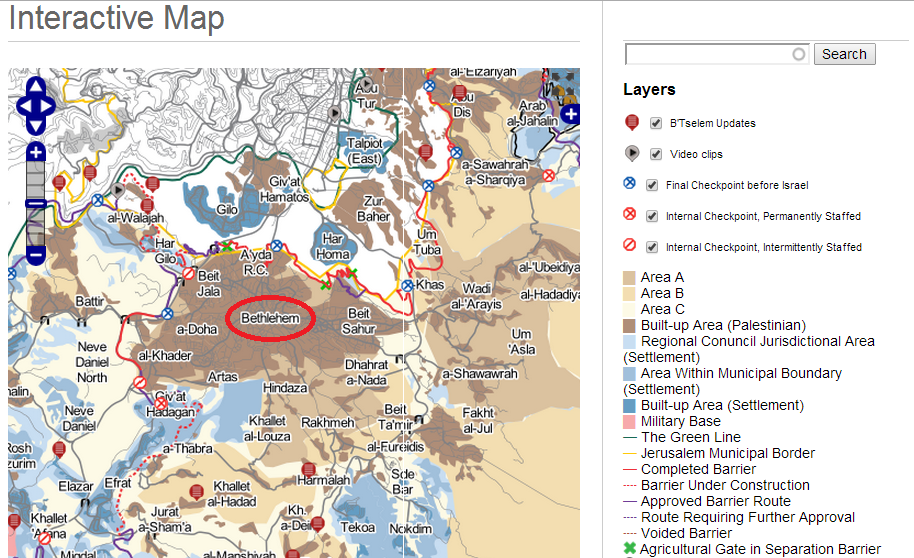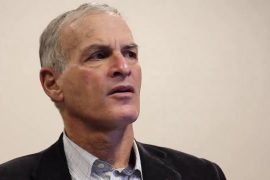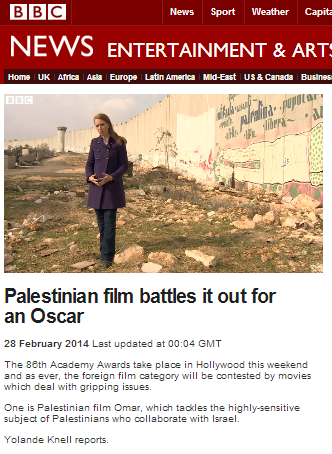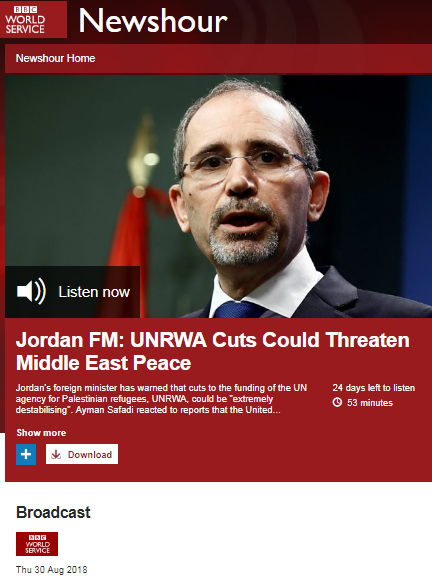Yesterday we took a look at Yolande Knell’s context-free amplification of politically motivated falsehoods and inaccuracies in her May 25th article concerning the Pope’s visit to the Middle East. Some of those same themes were to be found repeated in much of the rest of the BBC’s written and filmed coverage of the visit, suggesting that an element of editorial policy is at work.
In the May 24th report titled “Pope Francis praises Jordan at start of Middle East visit” which appeared on the BBC News website’s Middle East page on the first day of the visit, there appears an insert of commentary from the BBC’s Middle East editor Jeremy Bowen. Despite the fact that the first leg of the visit took place in Jordan, Bowen was already promoting specific misleading and inaccurate themes.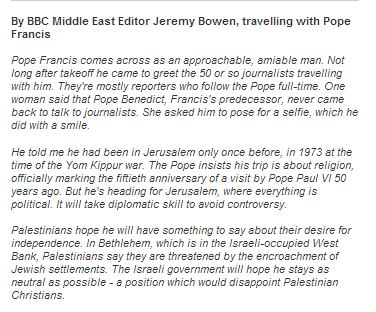
“In Bethlehem, which is in the Israeli-occupied West Bank, Palestinians say they are threatened by the encroachment of Jewish settlements.”
Bethlehem is of course situated in Area A and has been under Palestinian Authority control since 1995, in accordance with the terms of the Oslo II Interim Agreement on the West Bank and the Gaza Strip. In other words, it – like the rest of the PA controlled areas – is not “Israeli-occupied” as Bowen inaccurately informs readers. Not content with eradicating the Oslo Accords, Bowen also misleads BBC audiences with regard to the geography of the area by amplifying the baseless claim that Bethlehem is “threatened by the encroachment of Jewish settlements”. It is patently ridiculous to suggest that any “settlement” would at any time in the future ‘encroach’ into Areas A or B and – as has been repeatedly shown here – there are no Israeli towns, villages or neighbourhoods to the east and south of Bethlehem at all.
But by far the most heavily promoted theme in all of the BBC’s remarkably extensive coverage of the Pope’s visit, both on its website and in television reports, was a distorted representation of the anti-terrorist fence.
Let’s remind ourselves what the BBC’s style guide says about BBC presentation of that topic.
“BARRIER
BBC journalists should try to avoid using terminology favoured by one side or another in any dispute.
The BBC uses the terms “barrier”, “separation barrier” or “West Bank barrier” as acceptable generic descriptions to avoid the political connotations of “security fence” (preferred by the Israeli government) or “apartheid wall” (preferred by the Palestinians).
The United Nations also uses the term “barrier”.
Of course, a reporter standing in front of a concrete section of the barrier might choose to say “this wall” or use a more exact description in the light of what he or she is looking at.”
So did BBC journalists reporting the Pope’s visit stick to the use of accepted variations of the term ‘barrier’ and thus avoid “political connotations”?
An article which appeared on the BBC News website’s Middle East page on May 25th indeed runs with that BBC approved terminology in the headline “Pope prays at Israel’s West Bank separation barrier” and opens:
“Pope Francis has prayed at the concrete barrier Israel is building in and around the West Bank during his three-day tour of the Middle East.”
Later on in the article readers are told that:
“On his way to Bethlehem, he stopped to pray at an 8m concrete wall that is part of the barrier Israel is building in and around the West Bank.
The Pope rested his head against the wall – which Israel says is needed for security, but the Palestinians see as a land grab – near graffiti reading: “Free Palestine.” “
Those statements are clearly inaccurate and misleading to BBC audiences: Israel is not building a “concrete barrier….In and around the West Bank”. 97% of the anti-terrorist fence is just that – fence – with only 3% being constructed from concrete, mainly in areas where protection from snipers is necessary.
This article also includes an insert from Jeremy Bowen in which he states: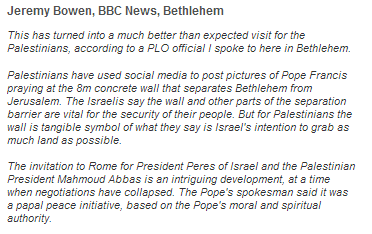
“Palestinians have used social media to post pictures of Pope Francis praying at the 8m concrete wall that separates Bethlehem from Jerusalem. The Israelis say the wall and other parts of the separation barrier are vital for the security of their people. But for Palestinians the wall is tangible symbol [sic] of what they say is Israel’s intention to grab as much land as possible.”
Here Bowen is misleadingly suggesting to BBC audiences that the aim of what the BBC elects to term the “separation barrier” is to separate Palestinian towns such as Bethlehem “from Jerusalem” when in fact the aim is to curb the infiltration of Palestinian terrorists into Israeli towns and cities. Notably, Bowen uses the standard BBC formula which presents audiences with two narratives concerning the anti-terrorist fence and reduces its proven record of stopping terror attacks to the subjective level of “Israel says”, whilst amplifying the notion of a “land grab” which has not taken place. As we have noted here before:
“Clearly, the BBC is very comfortable with its standard antique mantra on the subject of the anti-terrorist fence, but that does not mean that it complies with BBC standards of impartiality as set out in its editorial guidelines.
The systematic failure to present audiences with the readily available factual evidence which proves the anti-terrorist fence’s efficiency – rather than the subjective presentation of “Israel says” – is clearly a failure to distinguish “opinion from fact” and a major “omission of an important perspective”. The fact that a standard formula has been employed for over a decade also represents a failure to adhere to the demand for “impartiality over time”, presenting the same jaded “land grab” theme over a long period of years in which no such thing has happened.”
As we will see below, however, that theme was repeatedly promoted in additional BBC coverage.
In an article published on the BBC News website on May 26th under the title “Pope visits Jerusalem holy sites on last day in Middle East“, the misleading and inaccurate suggestion that the role of the anti-terrorist fence is to separate “Bethlehem from Jerusalem” was repeated and a structure which has saved countless Israeli lives was described to BBC audiences as “controversial”.
“The Pope spent a few minutes praying at the [Western] wall, as he did on Sunday at the controversial Israeli security barrier that separates the biblical town of Bethlehem in the West Bank from Jerusalem.”
In a filmed report by Jeremy Bowen titled “Pope visits refugee camp on Middle East tour” from May 25th which appeared on the BBC News website as well as on BBC television news, audiences were told:
“…the Pope earlier on today decided to stop to pray at the eight foot high – eight meter, I should say – high wall that separates Bethlehem from Jerusalem. The Israelis say it’s vital for their security. The Palestinians say that it’s a naked land grab and shows that Israelis aren’t serious about peace.”
In the synopsis to another filmed report which appeared on the BBC News website’s Europe page on May 25th under the title “What type of Pope is Francis? In 90 seconds” BBC audiences were again misled when they were informed that: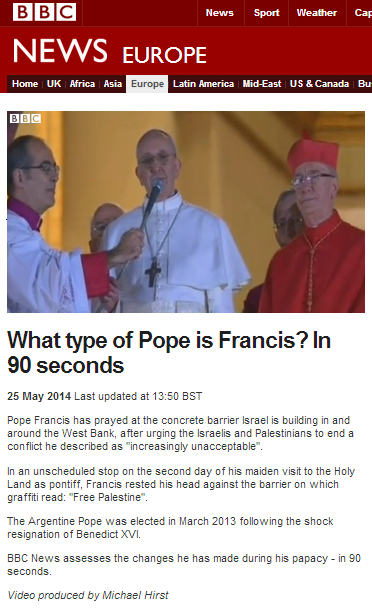
“Pope Francis has prayed at the concrete barrier Israel is building in and around the West Bank…..”
In Yolande Knell’s May 25th filmed report which appeared on BBC television news and on the BBC News website under the heading “Pope Francis prays at Israel’s West Bank barrier” BBC audiences were told that:
“….the Pope got out of his vehicle as he was driving here to the square and he made a prayer next to the eight meter-high concrete wall that Israel has built to separate Bethlehem from Jerusalem. It’s part of the West bank barrier that Israel’s building in and around the West Bank, saying it’s needed for security but the Palestinians see this wall, this barrier, as a land grab.”
In Jeremy Bowen’s May 25th report titled “Pope prays at Israel’s West Bank separation barrier” which appeared on the BBC News website and on BBC television news programmes, BBC audiences heard a Papal mind-reading Bowen say:
“Pope Francis touched his forehead on the wall that separates Bethlehem from Jerusalem to show his concern at the failure to bring peace to the Holy Land. […] Israel says the separation barrier is to keep its people safe. Palestinians say Israel is grabbing land they want for a state.”
So as we see, BBC audiences have been bombarded time and time again with the same jaded mantra: a mantra which deliberately misrepresents the aim and physical characteristics of the anti-terrorist fence.
Not once in any of the above reports were they told of the real reason why the anti-terrorist fence had to be built. Not once were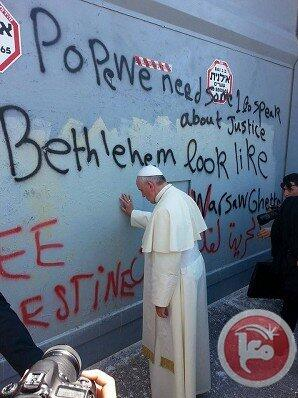 they reminded of the thousands of Israeli civilians of all creeds and ethnicities killed and maimed by Palestinian terrorists during the dark years of the second Intifada. Not once was the phrase ‘Palestinian terrorism’ even mentioned, nor likewise the rise in terror attacks seen since the last round of negotiations commenced. And not once was it pointed out to readers or viewers that the Pope’s photo-op took place beside Palestinian graffiti promoting the antisemitic comparison of Bethlehem to the Warsaw Ghetto.
they reminded of the thousands of Israeli civilians of all creeds and ethnicities killed and maimed by Palestinian terrorists during the dark years of the second Intifada. Not once was the phrase ‘Palestinian terrorism’ even mentioned, nor likewise the rise in terror attacks seen since the last round of negotiations commenced. And not once was it pointed out to readers or viewers that the Pope’s photo-op took place beside Palestinian graffiti promoting the antisemitic comparison of Bethlehem to the Warsaw Ghetto.
The uniformity of the style and content of BBC’s ‘wall’ mantra is remarkable: not even one BBC correspondent stepped out of line to bring any remotely deviating information to audiences. It is difficult to believe that this blatant exercise in – excuse the pun – wall to wall politically motivated amplification of PA propaganda was not pre-coordinated at editorial level, but if it was not, it certainly shows the extent to which a uniform political viewpoint has permeated the BBC’s staff.
Related Articles:
Does BBC reporting on Israel’s anti-terrorist fence meet standards of ‘due impartiality’? – part 3
BBC’s Knell exploits Christmas report to lie about anti-terrorist fence
The politics of BBC approved terminology on Israel’s security fence

